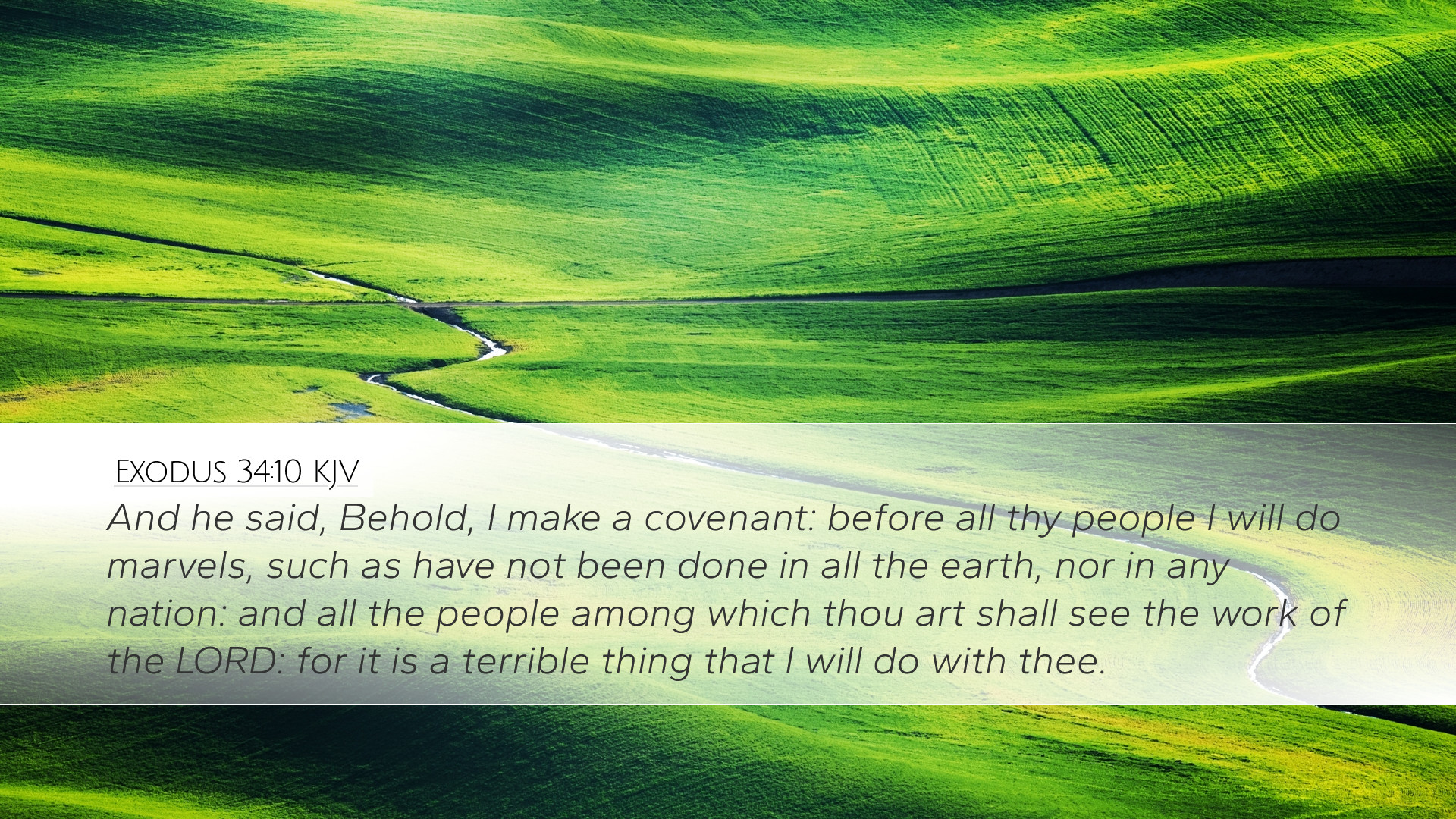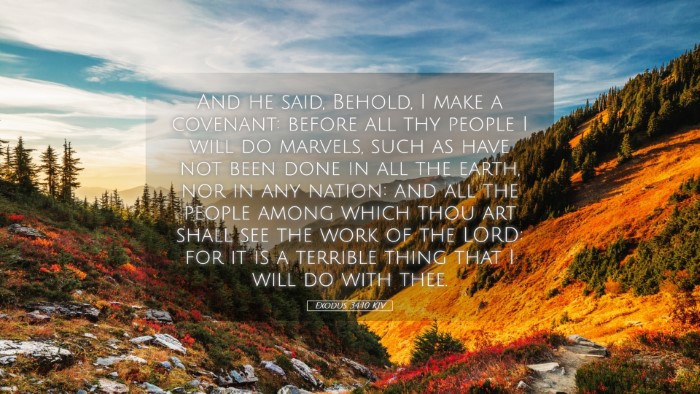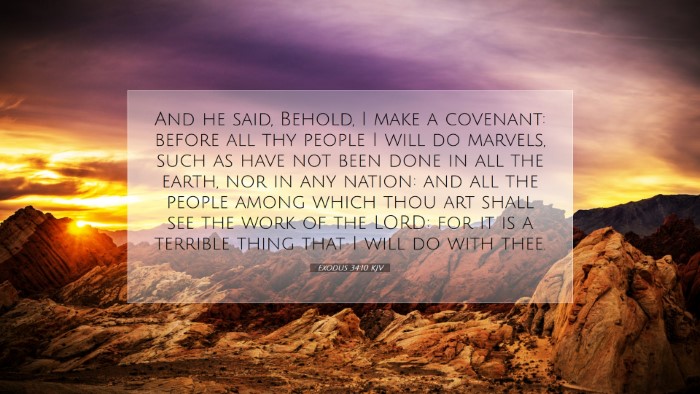Exodus 34:10 Commentary
Bible Verse: Exodus 34:10 - "And he said, Behold, I make a covenant: before all thy people I will do marvels, such as have not been done in all the earth, nor in any nation: and all the people among which thou art shall see the work of the LORD: for it is a terrible thing that I will do with thee."
Introduction
The verse of Exodus 34:10 stands at the heart of God's covenant with Israel after the golden calf incident, where Moses intercedes for the people. This covenant not only reaffirms God's commitment to Israel but also introduces a promise of extraordinary signs and wonders that would set Israel apart among the nations. The significance of this verse has been explored through various commentaries, offering deeper insights into its theological implications.
Divine Covenant
Matthew Henry: Henry emphasizes the importance of the covenant God establishes with Israel, highlighting that it is a significant moment of restoration after previous disobedience. The reference to a covenant indicates God’s unwavering mercy, emphasizing His willingness to forgive and renew His relationship with His people. The term "covenant" denotes a transformative bond that involves both parties, God's commitment to be their God and their commitment back to Him.
Albert Barnes: Barnes aligns with Henry in his view of the covenant, noting that God's promise is unconditionally merciful and yet profoundly binding. He brings to attention that this covenant is initiated by God, showcasing His grace even amidst human frailty and moral lapses. Consequently, this covenant does not merely reflect human faithfulness but underscores divine fidelity.
Adam Clarke: Clarke also observes the covenant as a pledge of divine favor and protection. He asserts that this moment is pivotal in the narrative of Israel, representing a renewal of commitment and highlighting the gravity of God's intentions toward His people. Clarke also expounds on the idea that God’s willingness to work wonders confirms His sovereignty and involvement in the world affairs of His people.
Marvels and Signs
Moses as Mediator: The covenant's introduction showcases Moses as a mediator between God and His people. God’s declaration of "marvels" indicates His omnipotence and unexplainable works that would communicate His authority to both Israel and surrounding nations. Henry remarked that these wonders are divine acts aimed at revealing God's glory and character.
Unprecedented Works: Barnes points out that the "marvels" promised are unparalleled, suggesting that God's interventions will transcend anything witnessed before. This uniqueness serves to elevate Israel’s status as God’s chosen people, setting a distinct focus upon God’s workings in history. Such declarations were not only meant to affirm Israel’s identity but to draw the attention of other nations to the One true God.
All-encompassing Reach: Clarke elaborates that the scope of these signs is intended for all nations, pointing to the ultimate purpose of God’s redemptive plan that extends beyond Israel. The intended visibility of God’s acts implies a divine strategy to demonstrate His power and dominion, evoking the admiration and fear of surrounding nations.
Fearful Wonders
The phrase "for it is a terrible thing that I will do" indicates that God's actions, while marvelous, will also evoke solemn awe. This fear or terror serves as a necessary reverence both within Israel and among other nations. Henry comments on the dual nature of God's interventions as both redemptive for Israel and a means of judgment against opposition.
God’s Holiness and Justice: Barnes emphasizes that God's workings will not only display His mercy but also illustrate His holiness and justice. The “terrible” connotation aligns with the reverence due to God's character, particularly in His displeasure against sin. This aspect calls for a response from the people of Israel where reverence, obedience, and a realization of God’s majesty must characterize their approach to worship and life.
Dynamic Relationship: Clarke highlights that this notion of terribleness should not evoke fear alone but a realization of the importance of being in a right relationship with God. The covenant encapsulates the dynamics of love, loyalty, and reverence required from Israel. God's promise incites a challenge to Israel to embody the faithfulness that the covenant demands, ultimately leading to profound blessings.
Theological Implications
God’s Sovereignty: At a theological level, the proclamations in Exodus 34:10 assert God’s sovereignty over the affairs of humanity. The promises made indicate that God is not passive but actively fulfilling His plans through history, signifying how His covenantal relationship with Israel is integral to His overarching narrative of redemption.
Identity and Purpose: The passage speaks profoundly to the identity of Israel as God’s chosen people, a theme echoed throughout the Scriptures. It encapsulates the divine purpose for Israel, who are called to testify to God’s greatness through their obedience and distinctiveness from other nations. For pastors and theologians, this raises the question of contemporary identity: how can the church today bear witness to God's marvelous works in a secular world?
Conclusion
The examination of Exodus 34:10 through the insights of Matthew Henry, Albert Barnes, and Adam Clarke reveals a layered understanding of God's covenant with Israel. It solidifies the understanding of God’s extraordinary works, His holiness, and the reverential fear He commands. This verse is not merely historical but offers a theological foundation for understanding God's nature, human obedience, and the continuing implications for faith communities today. As we engage with this text, it prompts a re-evaluation of our commitments, the nature of God’s work in our lives, and our response to His marvelous deeds in our contemporary context.


